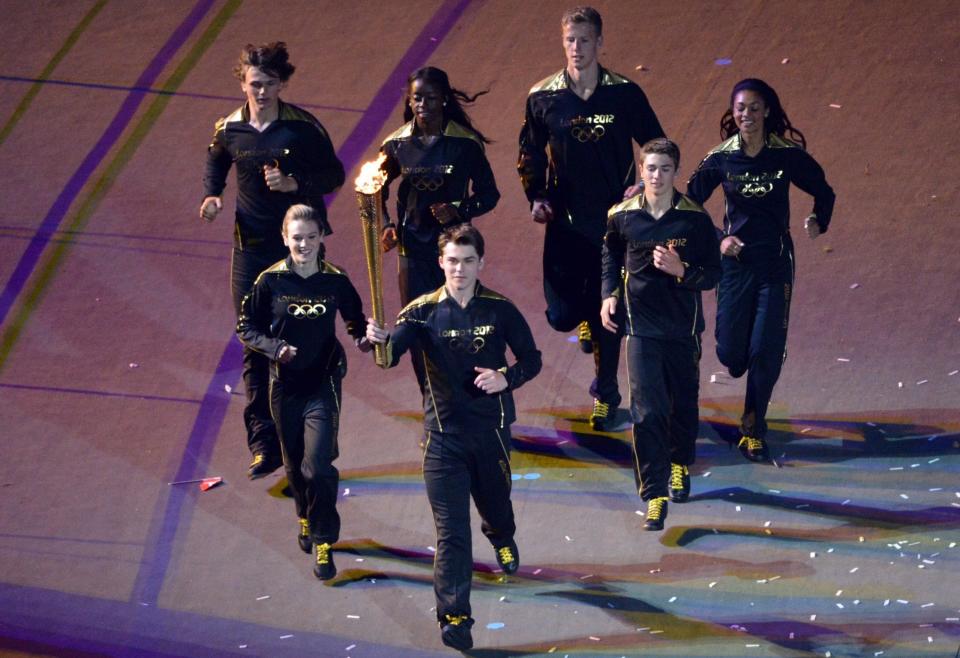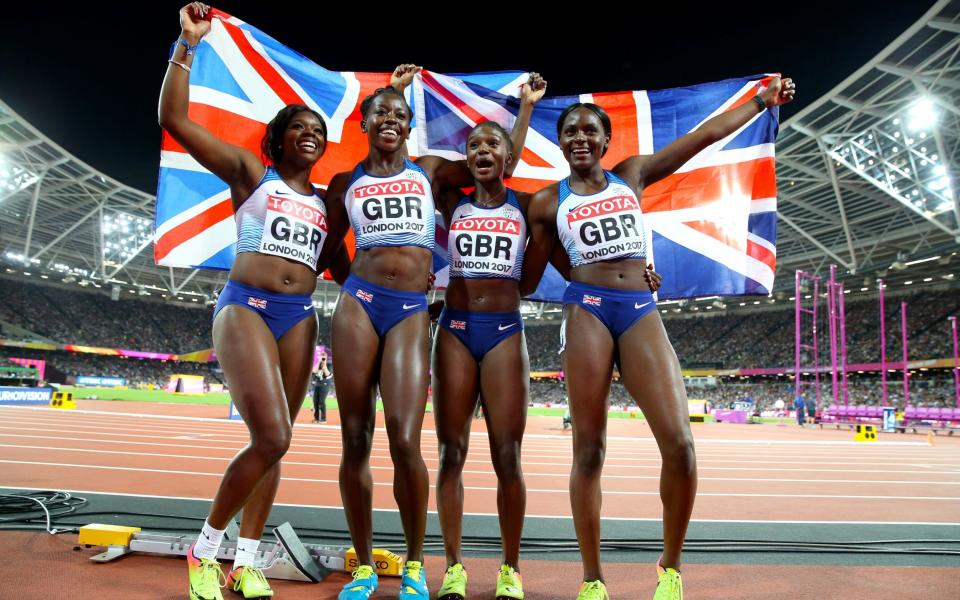Desiree Henry is a member of one of the most exclusive sports clubs in the world. The sprinter’s name is etched on the steps of the Olympic Museum in Lausanne, alongside those of Muhammad Ali, Cathy Freeman and Naomi Osaka, who was one of seven British teenagers to light the cauldron at the opening ceremony of the 2012 Olympic Games .
Henry is now 28 years old and still has the same glint of excitement in her eyes as she did almost twelve years ago. Despite appearing well on her way to realizing the potential that Daley Thompson saw when he selected her as his choice to represent the next generation of Team GB in 2012, and winning a bronze medal in Rio just four years later, she has suffered serious injuries and mental health problems. problems, missing out on selection for the Tokyo Games, loss of funding and having to work full-time. This year, however, things have moved in a positive direction.
When we meet at the Lee Valley Athletic Center in north London, Henry – a resident who “lives just down the road” in Enfield – can’t stop smiling, despite the hardships she has faced and the uncertainty surrounding Olympic selection for the Paris Games this summer.
In many ways, Henry’s story could be repeated on the big screen, starting with that famous night in London’s Olympic Park. The new concept for lighting the cauldron had been a closely guarded secret.
“When we were told that we’re the ones lighting the cauldron, it was like, ‘Huh, come again!’” says Henry, a big grin spreading across her face. “We were all just starting our careers. There was speculation on TV whether it would be David Beckham or anyone else. And then I was like, ‘Wait, you want us to be the ones?’”


Instead of being distracted by 900 million people watching worldwide, Henry instead gained a laser focus that would prepare her for the Rio Games.
“I think from then on that was my moment of focus because I just thought I wanted to be at the next Olympics. And it is actually doable. Now, at 16, I am much too young for this one, but for the next one I thought: I want to be there.”
Henry played a key role four years later as part of the 4 x 100m relay team, joining Asha Philip, Dina Asher-Smith and Daryll Neita on the podium to claim bronze after a disappointing performance for Team GB’s female sprinters individually . After winning an Olympic medal in the month of her 21st birthday, she seemed to have a long career ahead of her.
‘I don’t actually think I’m that happy’
In 2017, Henry returned to the London Stadium for the World Athletics Championships and was part of the relay team that went one better than Rio with silver. However, the injuries began to take their toll and she made the difficult decision to have surgery on both knees. The lengthy rehabilitation period turned Henry’s life upside down, leading to feelings of severe anxiety.


She opens up, explaining, “I think it was just panic and anxiety and honestly a little bit of crying, but I couldn’t really understand where it came from. But then a light bulb went off and I thought, ‘I don’t actually think I’m that happy.’”
Initially, she thought that using the extra time and freedom away from intense training to spend more time with friends or indulge in forbidden foods would do little to quell her grief.
“I thought that even being in a social environment doesn’t give me the calmness I needed.
She continues with a wry smile: “And then it’s back to trying to do things that make you happy. Like eating junk food, especially since I was in withdrawal, I thought I haven’t eaten bad things for most of my career. Let me try to enjoy the sweet things everyone tells me about. But it still made no difference.”
The issue of mental health in sport is not new, but Henry is refreshingly open in the way she explains the approach she has taken. Many athletes will talk about a sports psychologist or a mental skills coach – she felt like she had reached a point where she had experienced that and had to seek the help of a therapist rather than someone less qualified to express her thoughts about manage performance.
She says: “I know this isn’t a moment of, ‘Okay, how do I mentally set up my first 10 meters?’ No, ‘it’s: How do I wake up and feel good about myself? How do I get through the days and have a change in mindset when I’m recuperating after not being able to run, watch games and know I’m not there?’
‘There’s no sugar coating it. I had heard of therapy so often, but there was still the taboo that you had to be crazy. But I also thought that was true, I’m sure there’s room for me to just discuss how I think and feel, and for someone who doesn’t really know me to really help me. And I guess I was just happy to talk to someone who wasn’t in my world.
‘Henry has given me a different focus and is such an important part of my life’
For Henry, the other key to managing her anxiety was getting a puppy. Her dachshund is such an important part of her family that he is named Henry and acts as emotional support for her by traveling to longer training camps. “Just taking him to puppy classes changed my focus and now he is such an important part of my life. I think I’ve sat there, I’ve cried, I’ve been sad, and he’s just been there consistently. He doesn’t even know it, but he’s absolutely incredible – we’ve even worn matching outfits!”
The other misfortune that befell the sprinter was that she lost her British athletics funding in 2019. This meant she paid everything out of her own pocket in the run-up to the Tokyo Games, which she failed to make and after she determined to go to Paris. even if that meant taking on a full-time office job to pay for the coaching, physiotherapy, scans and costs associated with being a professional athlete.
It was through one of her passions outside of competition – talking to young girls about building self-confidence – that her dreams of a second Olympic Games became more likely when she was approached by insurance company Domestic & General asking if they would sponsor her so that she could return to life. a full-time athlete.
“I was training late into the night. My body didn’t recover very well either. I would say I had more aches and pains, more problems. And it was just ridiculously difficult to the point where I was doing well in the new job I had, but again, my performance was not good,” she says.
“I think 2023 became one of the hardest years for me because I thought, ‘What the hell am I going to do?’ But what I do know now is that I have to work. And that’s why I feel like what happened… call it the universe, call it God.
“It was the most incredible thing to have met Domestic & General during that process of still working, trying to figure out what my 2024 would look like, because I knew I would be working towards Paris.”
Henry won’t find out if she’s made the team until about a month before the Olympics, but if her sporting odyssey has had a clear impact, it’s that she’s beaming with anticipation, but also feeling like there will be acceptance instead of wringing her hands. we broke up.
“The goal for me, honestly, is just to make the team. And that can look like an individual event, whether it’s the 100 meters or the 200 meters, or part of the relay pool. I think realistically that’s what keeps me motivated. That’s the goal of making the team.”